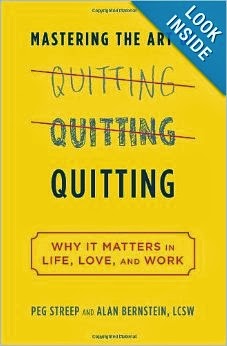
One of the most common questions I get asked about second-act careers is, “How do I know when is the right time to retire from my big job in order to pursue something new?”
In truth, there is no one formula for determining the optimal retirement date. In the “old” days, people worked until they were 65 (give or take a few years), had a retirement party, and then moved on. But in today’s job market, few people have a pre-defined retirement date – some retire at age 50 while others work until age 70 or later.
Deciding when to quit, and how best to move on, is a complex decision. That’s why I wanted to share this NPR interview with Alan Bernstein, co-author of Mastering the Art of Quitting: Why It Matters in Love, Life, and Work. It’s a fascinating discussion about how to best figure out your options when you’re trying to decide if you should go or if you should stay.
I recommend that you tune into the full interview by clicking here. But in the meantime, here are three key takeaways from the discussion:
1. It is always easier to disengage once you are actively moving towards something you want. I couldn’t agree more with this statement more. My clients always find it easier to make a change after they develop a vision for their second act, even if they haven’t yet worked out many of the specific details involved. Quitting without a destination in mind is as risky as embarking on a long journey without a map (or GPS) in hand.
2. Write down your thoughts – it will help clarify your direction: Just the act of imagining and writing down your thoughts is enormously helpful. Putting your thoughts on paper will help you to see meaningful patterns and crystalize your thinking.
Not sure what to write about? Here are three critical questions to ask yourself:
- What benefits do I derive from continuing on this path I am on?
- How do these benefits measure up against the possible benefits of changing my course?
- Are the benefits of my job mainly extrinsic (salary, prestige, stability, etc.) or intrinsic (challenge, fulfillment, feeling valued, etc.)?
Keep in mind that quitting your job doesn’t mean that you have to give up everything connected to that career in order to move forward. Think about what you enjoy most about your current job and then find ways to integrate the best of those building blocks into your next act.
3. Recognize Quitting Takes Courage: There is always anxiety and fear involved with letting go. But the feelings of exhilaration that goes along with moving towards a desired goal will help you power through it.
Bottom line?
If you love your job and your company loves you – or if you need to stay for financial reasons – then by all means keep right on working. But if you’re just hanging around because it’s tough to walk away from a long-time career, and the prestige, perks and predictability that come along with it, now might be the time to consider putting Plan B into action.





